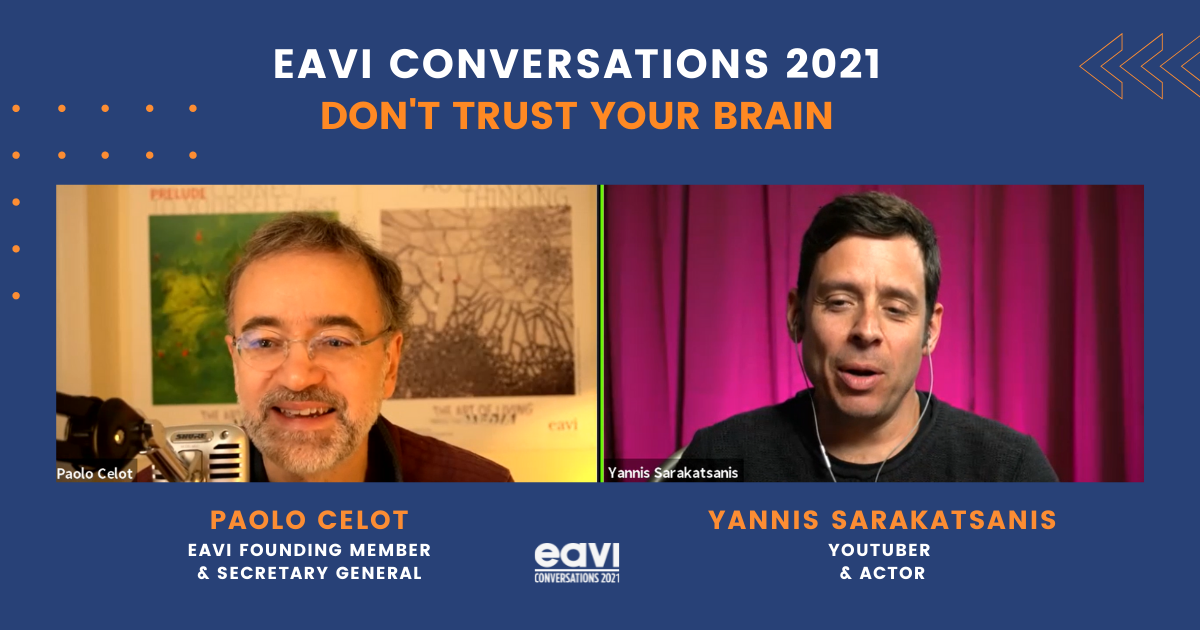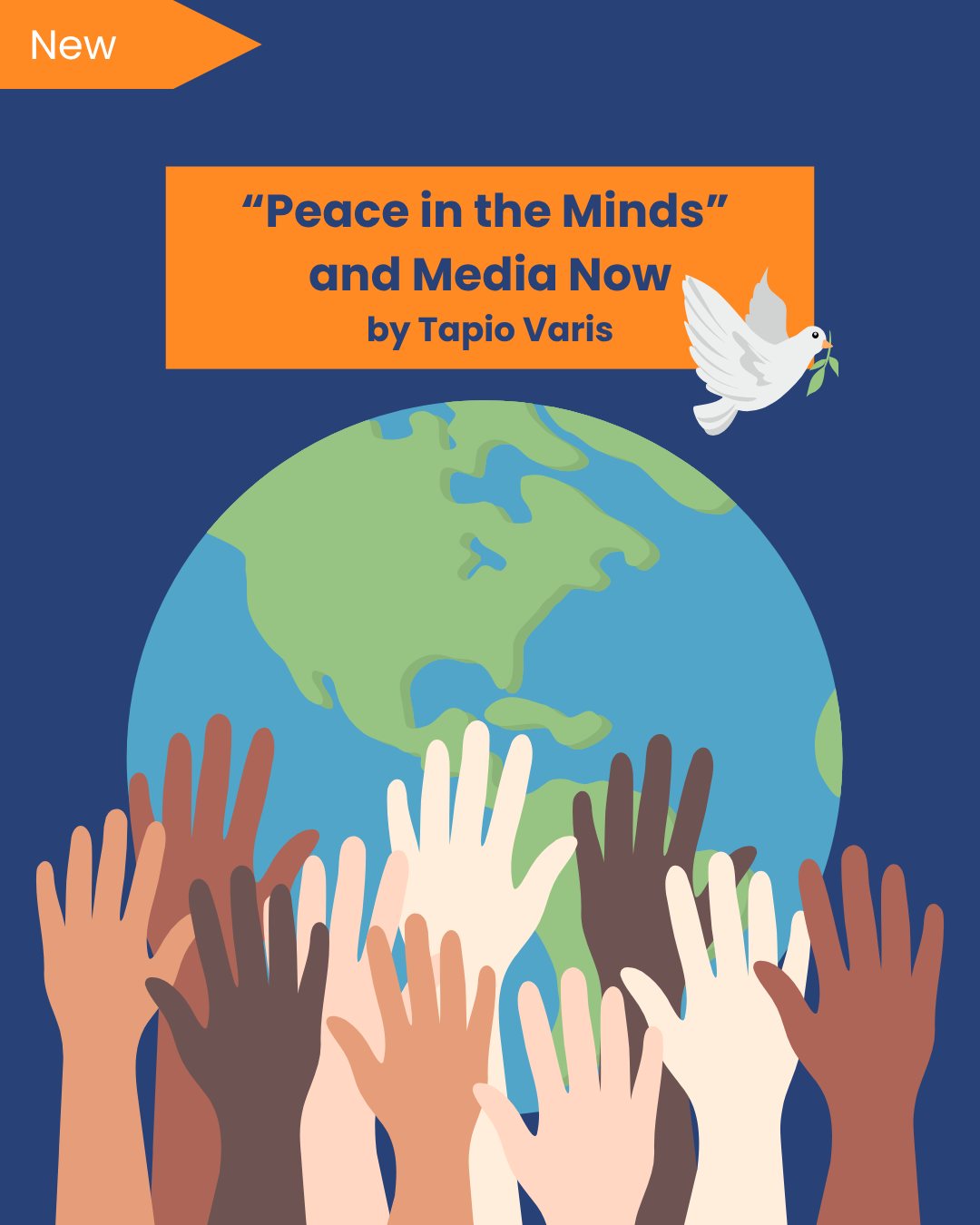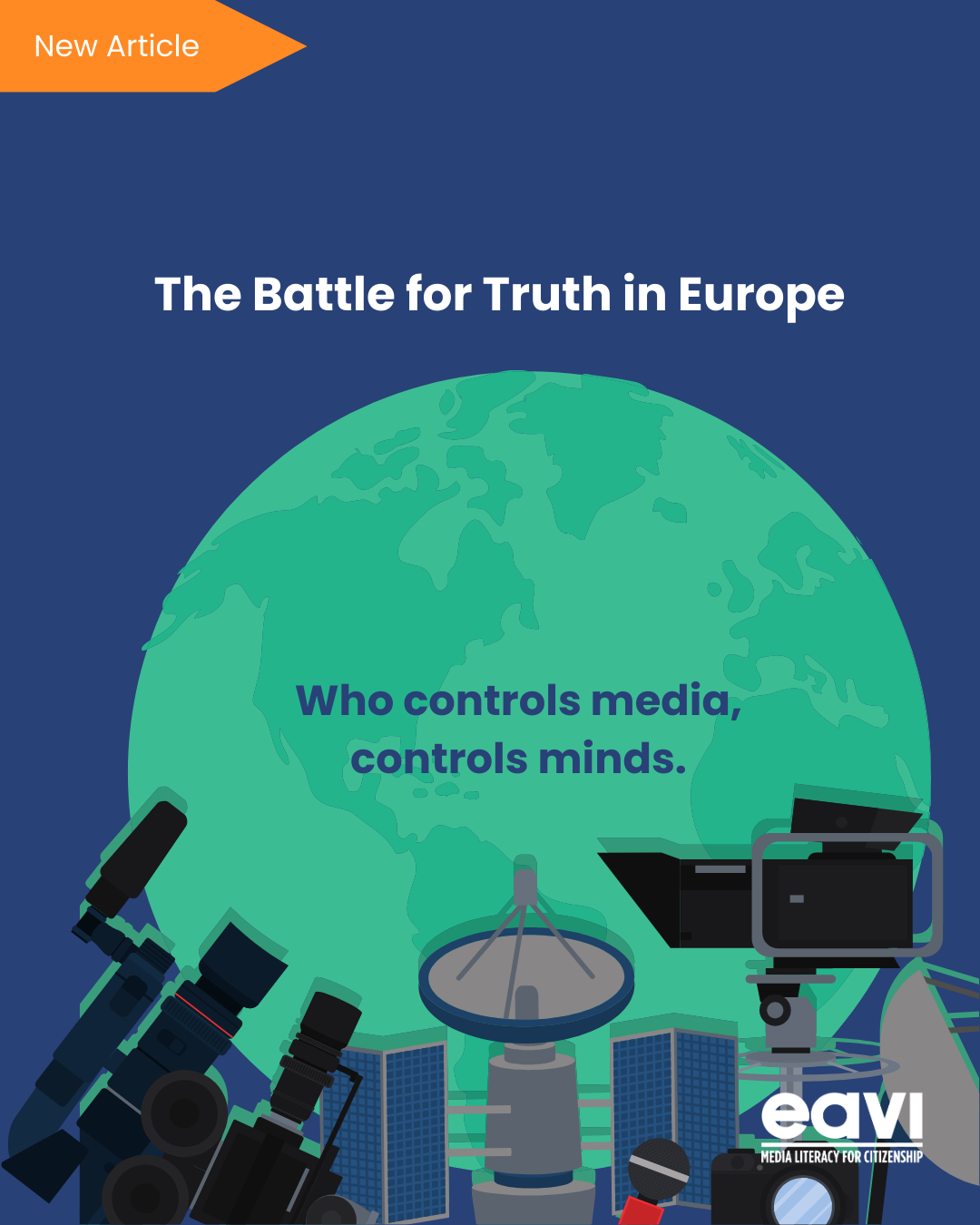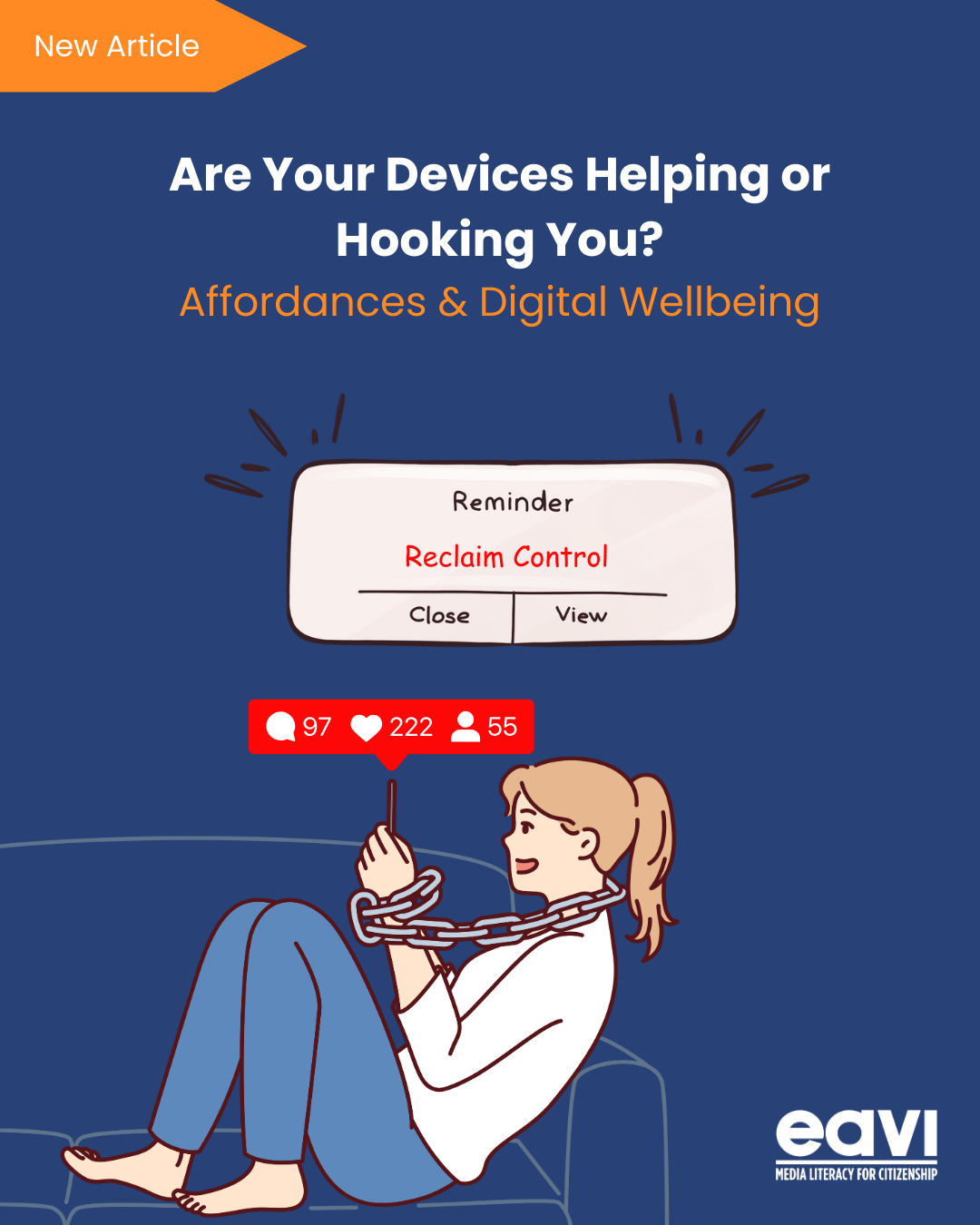Conclusions drawn from the discussion with Yannis Sarakatsanis – 11th of November (EAVI Conversations 2021)

Social media are versatile channels, although in the eyes of most of us entertainment is their main purpose. Our guest, Yannis Sarakatsanis, was able to use amusement for higher reasons. He started his YouTube channel in 2020, willing to describe current issues, breaking them down and analysing them in a funny and easy way, understandable to the general public. He is one of the few who made media literacy accessible to everyone! The key to his success? As he put it: “People enjoy my videos because I try to teach them something without making them feel they are being taught”.
How our brain works when we are confronted with disinformation and conspiracy theories online is the core topic in his videos and a relevant one for what concerns media literacy too. A useful analogy by Jonathan Heidt comes to our help. In his book ‘The righteous mind’, he describes how our minds are divided into two parts: an emotional side (the elephant) and an analytical, rational side (the rider). The rider is rational and should discern a path, while the elephant is driven by emotions and instincts.
That’s exactly how we behave when it comes to social media. First, we take decisions driven by emotions and impulses and we act based on them (this is an unconscious process), and only later we create reasons to justify those decisions. Most of the time our beliefs are getaways that will ease our “pain”, they will help us escape from something we do not want to accept. For example, during the COVID -19 pandemic, we all went through a difficult time and most people lost their jobs or even their loved ones. Most of us resorted to self-defence mechanisms, believing and asserting COVID-19 did not exist and governments were trying to manipulate or enslave us. In a nutshell, this is the way conspiracy theories are born and thrive in an already complex online environment. So where did the rider and the elephant go? We feel like we ride the elephant, but the truth is the elephant controls us and we just follow his movements.
Despite the above, the problem with social media and online information is bigger than just being able to understand what is true or false. The real issue hides at a deeper level, as social media are able to manipulate and affect our emotions. Algorithms are built in a way to give more relevance to posts with the most likes, comments, and shares, and these are likely to be the ones touching people’s negative emotions like sadness or fear. It is much more difficult indeed to cause a massive reaction to positive content or non-disruptive headlines. It goes without saying that conspiracy theories and disinformation’s authors are well aware of these mechanisms, as well as social media platforms. There is a vast scientific literature dealing with how our brains work and certainly social media companies are harnessing this knowledge to trick our brains for their own business benefits.
Everyone is vulnerable and can become a ”victim” without realising what is behind the screen. Yannis’ experience is a bright example of how we can easily be fooled online. While waiting to get the blue checkmark on Instagram, he received a notification saying he finally got it. He later clicked on the link, and he lost his Instagram account in no time. Afterwards, the hackers asked him for money to restore his account. Many people have experienced something similar; everyone has possibly fallen into traps at some point. This was a feeling the webinar participants also had: more than 85% admitted to having been cheated online, sometimes even without them realising it.
What we should be really worried about are the implications that the above problems have on a bigger scale, resulting in severe disruptions in our democracies. If everyone of us is likely to be manipulated at some point, this means nobody can be considered exempt from this phenomenon. Therefore, when it comes to political opinions, elections, and referendums, we could be biased. Shawn Rosenberg, an American political psychologist, defined social media as the ultimate tool to democracy, as in principle they allow everyone to participate in democratic life. His work inspired Yannis to shoot the video “Who killed democracy”. Although potentially social media could improve our political systems, they are currently not helping that much. We are not able to handle such a huge direct political representation, therefore we tend to simplify our world due to our inability to deal with the complexity of it. As a consequence, polarisations becoming a trend, black and white is preferred and disinformation and conspiracy theories are channelled to citizens in this way. Creating identities through fear and extremism is more effective than aspiring to better outcomes through positive messages.
During the conversation with Yannis, we also tried to address a crucial question: ”How can we solve the problem?”. Obviously, there could be different options: raise awareness, educate, increase people’s responsibility towards the media environment and build trust. In Yannis’ words: “We should invest more in people”. This is definitely a slow process, and we cannot expect a sudden change, but hopefully constant improvements. In the meanwhile, before we voice our opinions online, it is important to take a step back and think, or even better, question what we believe and why. Ultimately, we are responsible for creating this digital world somehow. It is also true we cannot do it properly unless we take the reins and rebel against all these algorithms and strive to explore others’ perspectives. We need to focus on maintaining a balance between the online and offline world and not losing touch with reality.
For the future, Yannis wishes that kindness becomes a ”trendy skill” for everyone! People should respond to what is happening to nurture real and closer relationships. It is up to us to bring change, respect others and create a safer online environment, by empowering the next generation of citizens as well.
Are you interested in watching the different sessions of the EAVI Conversations 2021?
Conclusions drawn from the discussion with Yannis Sarakatsanis – 11th of November (EAVI Conversations 2021)

Social media are versatile channels, although in the eyes of most of us entertainment is their main purpose. Our guest, Yannis Sarakatsanis, was able to use amusement for higher reasons. He started his YouTube channel in 2020, willing to describe current issues, breaking them down and analysing them in a funny and easy way, understandable to the general public. He is one of the few who made media literacy accessible to everyone! The key to his success? As he put it: “People enjoy my videos because I try to teach them something without making them feel they are being taught”.
How our brain works when we are confronted with disinformation and conspiracy theories online is the core topic in his videos and a relevant one for what concerns media literacy too. A useful analogy by Jonathan Heidt comes to our help. In his book ‘The righteous mind’, he describes how our minds are divided into two parts: an emotional side (the elephant) and an analytical, rational side (the rider). The rider is rational and should discern a path, while the elephant is driven by emotions and instincts.
That’s exactly how we behave when it comes to social media. First, we take decisions driven by emotions and impulses and we act based on them (this is an unconscious process), and only later we create reasons to justify those decisions. Most of the time our beliefs are getaways that will ease our “pain”, they will help us escape from something we do not want to accept. For example, during the COVID -19 pandemic, we all went through a difficult time and most people lost their jobs or even their loved ones. Most of us resorted to self-defence mechanisms, believing and asserting COVID-19 did not exist and governments were trying to manipulate or enslave us. In a nutshell, this is the way conspiracy theories are born and thrive in an already complex online environment. So where did the rider and the elephant go? We feel like we ride the elephant, but the truth is the elephant controls us and we just follow his movements.
Despite the above, the problem with social media and online information is bigger than just being able to understand what is true or false. The real issue hides at a deeper level, as social media are able to manipulate and affect our emotions. Algorithms are built in a way to give more relevance to posts with the most likes, comments, and shares, and these are likely to be the ones touching people’s negative emotions like sadness or fear. It is much more difficult indeed to cause a massive reaction to positive content or non-disruptive headlines. It goes without saying that conspiracy theories and disinformation’s authors are well aware of these mechanisms, as well as social media platforms. There is a vast scientific literature dealing with how our brains work and certainly social media companies are harnessing this knowledge to trick our brains for their own business benefits.
Everyone is vulnerable and can become a ”victim” without realising what is behind the screen. Yannis’ experience is a bright example of how we can easily be fooled online. While waiting to get the blue checkmark on Instagram, he received a notification saying he finally got it. He later clicked on the link, and he lost his Instagram account in no time. Afterwards, the hackers asked him for money to restore his account. Many people have experienced something similar; everyone has possibly fallen into traps at some point. This was a feeling the webinar participants also had: more than 85% admitted to having been cheated online, sometimes even without them realising it.
What we should be really worried about are the implications that the above problems have on a bigger scale, resulting in severe disruptions in our democracies. If everyone of us is likely to be manipulated at some point, this means nobody can be considered exempt from this phenomenon. Therefore, when it comes to political opinions, elections, and referendums, we could be biased. Shawn Rosenberg, an American political psychologist, defined social media as the ultimate tool to democracy, as in principle they allow everyone to participate in democratic life. His work inspired Yannis to shoot the video “Who killed democracy”. Although potentially social media could improve our political systems, they are currently not helping that much. We are not able to handle such a huge direct political representation, therefore we tend to simplify our world due to our inability to deal with the complexity of it. As a consequence, polarisations becoming a trend, black and white is preferred and disinformation and conspiracy theories are channelled to citizens in this way. Creating identities through fear and extremism is more effective than aspiring to better outcomes through positive messages.
During the conversation with Yannis, we also tried to address a crucial question: ”How can we solve the problem?”. Obviously, there could be different options: raise awareness, educate, increase people’s responsibility towards the media environment and build trust. In Yannis’ words: “We should invest more in people”. This is definitely a slow process, and we cannot expect a sudden change, but hopefully constant improvements. In the meanwhile, before we voice our opinions online, it is important to take a step back and think, or even better, question what we believe and why. Ultimately, we are responsible for creating this digital world somehow. It is also true we cannot do it properly unless we take the reins and rebel against all these algorithms and strive to explore others’ perspectives. We need to focus on maintaining a balance between the online and offline world and not losing touch with reality.
For the future, Yannis wishes that kindness becomes a ”trendy skill” for everyone! People should respond to what is happening to nurture real and closer relationships. It is up to us to bring change, respect others and create a safer online environment, by empowering the next generation of citizens as well.
Are you interested in watching the different sessions of the EAVI Conversations 2021?
Conclusions drawn from the discussion with Yannis Sarakatsanis – 11th of November (EAVI Conversations 2021)

Social media are versatile channels, although in the eyes of most of us entertainment is their main purpose. Our guest, Yannis Sarakatsanis, was able to use amusement for higher reasons. He started his YouTube channel in 2020, willing to describe current issues, breaking them down and analysing them in a funny and easy way, understandable to the general public. He is one of the few who made media literacy accessible to everyone! The key to his success? As he put it: “People enjoy my videos because I try to teach them something without making them feel they are being taught”.
How our brain works when we are confronted with disinformation and conspiracy theories online is the core topic in his videos and a relevant one for what concerns media literacy too. A useful analogy by Jonathan Heidt comes to our help. In his book ‘The righteous mind’, he describes how our minds are divided into two parts: an emotional side (the elephant) and an analytical, rational side (the rider). The rider is rational and should discern a path, while the elephant is driven by emotions and instincts.
That’s exactly how we behave when it comes to social media. First, we take decisions driven by emotions and impulses and we act based on them (this is an unconscious process), and only later we create reasons to justify those decisions. Most of the time our beliefs are getaways that will ease our “pain”, they will help us escape from something we do not want to accept. For example, during the COVID -19 pandemic, we all went through a difficult time and most people lost their jobs or even their loved ones. Most of us resorted to self-defence mechanisms, believing and asserting COVID-19 did not exist and governments were trying to manipulate or enslave us. In a nutshell, this is the way conspiracy theories are born and thrive in an already complex online environment. So where did the rider and the elephant go? We feel like we ride the elephant, but the truth is the elephant controls us and we just follow his movements.
Despite the above, the problem with social media and online information is bigger than just being able to understand what is true or false. The real issue hides at a deeper level, as social media are able to manipulate and affect our emotions. Algorithms are built in a way to give more relevance to posts with the most likes, comments, and shares, and these are likely to be the ones touching people’s negative emotions like sadness or fear. It is much more difficult indeed to cause a massive reaction to positive content or non-disruptive headlines. It goes without saying that conspiracy theories and disinformation’s authors are well aware of these mechanisms, as well as social media platforms. There is a vast scientific literature dealing with how our brains work and certainly social media companies are harnessing this knowledge to trick our brains for their own business benefits.
Everyone is vulnerable and can become a ”victim” without realising what is behind the screen. Yannis’ experience is a bright example of how we can easily be fooled online. While waiting to get the blue checkmark on Instagram, he received a notification saying he finally got it. He later clicked on the link, and he lost his Instagram account in no time. Afterwards, the hackers asked him for money to restore his account. Many people have experienced something similar; everyone has possibly fallen into traps at some point. This was a feeling the webinar participants also had: more than 85% admitted to having been cheated online, sometimes even without them realising it.
What we should be really worried about are the implications that the above problems have on a bigger scale, resulting in severe disruptions in our democracies. If everyone of us is likely to be manipulated at some point, this means nobody can be considered exempt from this phenomenon. Therefore, when it comes to political opinions, elections, and referendums, we could be biased. Shawn Rosenberg, an American political psychologist, defined social media as the ultimate tool to democracy, as in principle they allow everyone to participate in democratic life. His work inspired Yannis to shoot the video “Who killed democracy”. Although potentially social media could improve our political systems, they are currently not helping that much. We are not able to handle such a huge direct political representation, therefore we tend to simplify our world due to our inability to deal with the complexity of it. As a consequence, polarisations becoming a trend, black and white is preferred and disinformation and conspiracy theories are channelled to citizens in this way. Creating identities through fear and extremism is more effective than aspiring to better outcomes through positive messages.
During the conversation with Yannis, we also tried to address a crucial question: ”How can we solve the problem?”. Obviously, there could be different options: raise awareness, educate, increase people’s responsibility towards the media environment and build trust. In Yannis’ words: “We should invest more in people”. This is definitely a slow process, and we cannot expect a sudden change, but hopefully constant improvements. In the meanwhile, before we voice our opinions online, it is important to take a step back and think, or even better, question what we believe and why. Ultimately, we are responsible for creating this digital world somehow. It is also true we cannot do it properly unless we take the reins and rebel against all these algorithms and strive to explore others’ perspectives. We need to focus on maintaining a balance between the online and offline world and not losing touch with reality.
For the future, Yannis wishes that kindness becomes a ”trendy skill” for everyone! People should respond to what is happening to nurture real and closer relationships. It is up to us to bring change, respect others and create a safer online environment, by empowering the next generation of citizens as well.








































































































































































